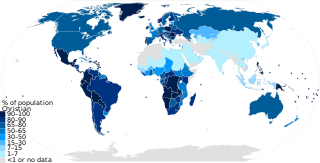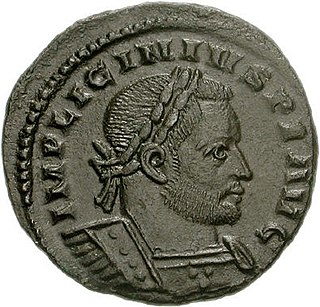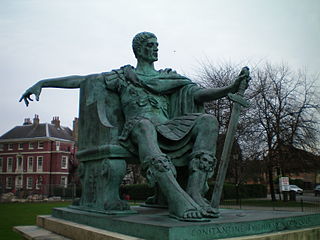
Christendom historically refers to the "Christian world": Christian states, Christian-majority countries and the countries in which Christianity dominates or prevails.

Constantine I, also known as Constantine the Great, was a Roman emperor from 306 to 337. Born in Naissus, Dacia Mediterranea, he was the son of Flavius Constantius, an Illyrian army officer who became one of the four emperors of the Tetrarchy. His mother, Helena, was Greek and of low birth. Constantine served with distinction under emperors Diocletian and Galerius campaigning in the eastern provinces against barbarians and the Persians, before being recalled west in 305 to fight under his father in Britain. After his father's death in 306, Constantine was acclaimed as emperor by the army at Eboracum (York). He emerged victorious in the civil wars against emperors Maxentius and Licinius to become sole ruler of the Roman Empire by 324.

The First Council of Nicaea was a council of Christian bishops convened in the Bithynian city of Nicaea by the Roman Emperor Constantine I in AD 325.

Licinius was Roman emperor from 308 to 324. For most of his reign he was the colleague and rival of Constantine I, with whom he co-authored the Edict of Milan, AD 313, that granted official toleration to Christians in the Roman Empire. He was finally defeated at the Battle of Chrysopolis, and was later executed on the orders of Constantine I.

The Donation of Constantine is a forged Roman imperial decree (Diplom) by which the 4th-century emperor Constantine the Great supposedly transferred authority over Rome and the western part of the Roman Empire to the Pope. Composed probably in the 8th century, it was used, especially in the 13th century, in support of claims of political authority by the papacy. In many of the existing manuscripts, including the oldest one, the document bears the title Constitutum domini Constantini imperatoris. The Donation of Constantine was included in the 9th-century collection Pseudo-Isidorean Decretals.

Peter Robert Lamont Brown is Rollins Professor of History Emeritus at Princeton University. He is credited with having brought coherence to the field of Late Antiquity, and is sometimes regarded as the inventor of the field. His work has concerned, in particular, the religious culture of the later Roman Empire and early medieval Europe, and the relation between religion and society.

Constantinian shift is used by some theologians and historians of antiquity to describe the political and theological aspects and outcomes of the 4th-century process of Constantine's integration of the imperial government with the Christian Church that began with the First Council of Nicaea. The term was popularized by the Mennonite theologian John H. Yoder.

John Howard Yoder (1927–1997) was an American theologian and ethicist best known for his defense of Christian pacifism. His most influential book was The Politics of Jesus, which was first published in 1972. Yoder was a Mennonite and wrote from an Anabaptist perspective. He spent the latter part of his career teaching at the University of Notre Dame.
Sacralism is the confluence of church and state wherein one is called upon to change the other. It also denotes a perspective that views church and state as tied together instead of separate entities so that people within a geographical and political region are considered members of the dominant ecclesiastical institution.

During the reign of the Roman Emperor Constantine the Great (AD 306–337), Christianity began to transition to the dominant religion of the Roman Empire. Historians remain uncertain about Constantine's reasons for favoring Christianity, and theologians and historians have often argued about which form of early Christianity he subscribed to. There is no consensus among scholars as to whether he adopted his mother Helena's Christianity in his youth, or, as claimed by Eusebius of Caesarea, encouraged her to convert to the faith he had adopted himself.

The history of Christian thought has included concepts of both inclusivity and exclusivity from its beginnings, that have been understood and applied differently in different ages, and have led to practices of both persecution and toleration. Early Christian thought established Christian identity, defined heresy, separated itself from polytheism and Judaism and invented supersessionism. In the centuries after Christianity became the official religion of Rome, some scholars say Christianity became a persecuting religion, while others say the change to Christian leadership did not cause any substantive persecution of pagans.
Alan Kreider was the American Professor Emeritus of Church History and Mission at the Anabaptist Mennonite Biblical Seminary in Elkhart, Indiana. His main interests were mission, worship, peace, and ecclesiastical history. Kreider continued to speak, write and publish in these areas of interest until his death in May 2017.

The Vision of the Cross is a painting made between 1520 and 1524 by assistants of the Italian renaissance artist Raphael. After the master's death in 1520, Gianfrancesco Penni, Giulio Romano and Raffaellino del Colle from Raphael's workshop worked together to finish the commission to decorate with frescoes the rooms that are now known as the Stanze di Raffaello, in the Apostolic Palace in the Vatican.
Peter James Leithart is an American author, minister, and theologian, who serves as president of Theopolis Institute for Biblical, Liturgical, & Cultural Studies in Birmingham, Alabama. He previously served as Senior Fellow of Theology and Literature as well as Dean of Graduate Studies at New Saint Andrews College. He was selected by the Association of Reformed Institutions of Higher Education to be one of the organization's 2010–2012 Lecturers. He is the author of commentaries on the Book of Kings, the Book of Samuel, the Books of Chronicles, the Book of Revelation, as well as a Survey of the Old Testament. Other works include books on topics such as Dante's Inferno, Shakespeare, and Jane Austen. He is also the author of a book of children's bedtime stories titled Wise Words based on the Book of Proverbs.

Constantinianism refers to those policies said to be enacted, encouraged, or personally favored by Constantine the Great, a 4th-century Roman Emperor. In particular, it may refer to any of the following:
John D. Roth is the current editor of The Mennonite Quarterly Review and director of the Institute for the Study of Global Anabaptism at Goshen College. He received his PhD from the University of Chicago. His books include Choosing Against War: A Christian View, Beliefs: Mennonite Faith and Practice, Stories: How Mennonites Came to Be, and Practices: Mennonite Worship and Witness. He discussed his book on war in several places including the Netherlands. He has also written for Christianity Today concerning the Anabaptists and Amish.
The Politics of Jesus is a 1972 book by the American theologian and ethicist John Howard Yoder. In it, Yoder argues against popular views of Jesus, particularly those views held by Reinhold Niebuhr, which he believed to be dominant at the time. Niebuhr argued for a realist philosophy, which Yoder felt failed to take seriously the call or person of Jesus Christ. After showing what he believed to be inconsistencies of Niebuhr's perspective, Yoder attempted to demonstrate by an exegesis of the Gospel of Luke and parts of Paul's Letter to the Romans that, in his view, a radical Christian pacifism was the most faithful approach for the disciple of Christ. Yoder argued that being Christian is a political standpoint and that Christians ought not ignore that calling.

Christianity in late antiquity traces Christianity during the Christian Roman Empire – the period from the rise of Christianity under Emperor Constantine, until the fall of the Western Roman Empire. The end-date of this period varies because the transition to the sub-Roman period occurred gradually and at different times in different areas. One may generally date late ancient Christianity as lasting to the late 6th century and the re-conquests under Justinian of the Byzantine Empire, though a more traditional end-date is 476, the year in which Odoacer deposed Romulus Augustus, traditionally considered the last western emperor.

The Religious policies of Constantine the great have been called "ambiguous and elusive." Born in 273 during the Crisis of the Third Century, he was thirty at the time of the Great Persecution, saw his father become Augustus of the West and then shortly die, spent his life in the military warring with much of his extended family, and converted to Christianity sometime around 40 years of age. His religious policies, formed from these experiences, comprised increasing toleration of Christianity, limited regulations against Roman polytheism with toleration, participation in resolving religious disputes such as schism with the Donatists, and the calling of councils including the Council of Nicaea concerning Arianism. John Kaye characterizes the conversion of Constantine, and the council of Nicea that Constantine called, as two of the most important things to ever happen to the Christian church.
Life of Constantine the Great is a panegyric written in Greek in honor of Constantine the Great by Eusebius of Caesarea in the 4th century AD. It was never completed due to the death of Eusebius in 339. The work provides scholars with one of the most comprehensive sources for the religious policies of Constantine's reign. In addition to detailing the religious policies of the Roman Empire under Constantine, Eusebius uses Life of Constantine to engage several of his own religious concerns, such as apologetics, as well as a semi-bibliographic account of Constantine. Its reliability as a historical text has been called into question by several historians, most notably Timothy Barnes, because of its questionable motives and writing style.














